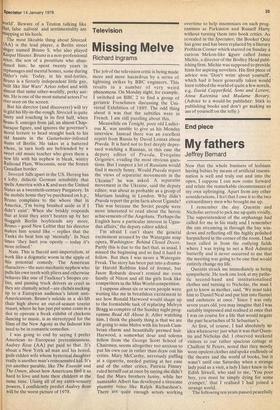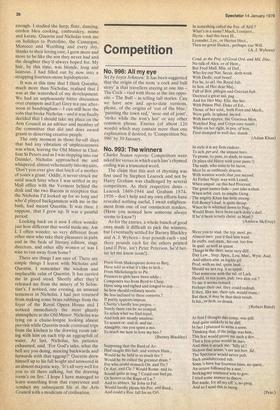End piece
My fathers
Jeffrey Bernard
Now that the whole business of lesbians having babies by means of artificial insemi nation is well and truly out and into the open, I suppose I can now come forward and relate the remarkable circumstances of my own upbringing. Apart from any other considerations, I feel that I owe it to the two extraordinary men who brought me up.
I remember the day Quentin and Nicholas arrived to pick me up quite vividly. The superintendent of the orphanage had called for me in his study and I remember the sun streaming in through the bay windows and reflecting off the highly polished harpsichord in the corner of the room. I had been called in from the outlying fields where I was trying to net a Red Admiral butterfly and it never occurred to me that the meeting was going to be one that would entirely change my life.
Quentin struck me immediately as being sympathetic. He took one look at my pathetic second-hand and institutionalised clothes and turning to Nicholas, the man I got to know as mother, said, `We must take him to Daniel Neal and put him into flannel and cashmere at once.' Since I was only seven years old, you may imagine that I was suitably impressed and realised at once that I was on course for a life that would negate the past heartaches of St Sebastian's.
At first, of course, I had absolutely no idea whatsoever just what it was that Quentin and Nicholas did. I observed weekend visitors to our rather spacious cottage at Chalfont St Peters, noted that they mostly wore opulent clothes and spoke endlessly of the theatre and the world of books, but it wasn't until one Saturday when a strange lady paid us a visit, a lady I later knew to be Edith Sitwell, who said to me, 'You poor boy, you must be simply dying for some crumpet,' that I realised I had joined a strange world. The following ten years passed peacefully
enough. I studied the harp, flute, dancing, cordon bleu cooking, embroidery, mime and karate. Quentin and Nicholas took me on holidays to Portofino, the Camargue, Morocco and Worthing and every day, thanks to their loving care, I grew more and more to be like the son they never had and the daughter they'd always hoped for. My hair, by this time, was blonde, long and lustrous. I had filled out by now into a . strapping fourteen-stone lepidopterist.
It was at this time that I think Quentin, much more than Nicholas, realised that I was at the watershed of my development. We had an unpleasantly bitter discussion over crumpets and Earl Grey tea one afternoon at Sandringham — I can still hear the sobs that broke Nicholas — and it was finally decided that I should take my place on the Arts Council as an adviser and member of the committee that did and does award grants to deserving creative people.
The only moment in those far-off days that had any vibration of unpleasantness was when, leaving the Old Manor in Chalfont St Peters and as I was stepping into our Daimler, Nicholas approached me and whispered, almost vehemently into my cars, 'Don't you ever give that bitch of a mother of yours a grant.' Oddly, it never struck me until much later when I was settled in my Mall office with the Vermeer behind the desk and the two Bacons in reception that the Nicholas I'd looked up for so long and who'd played backgammon with me in the bath, had meant Quentin. It was then, I suppose, that I grew up. It was a painful period.
Looking back on it now I often wonder just how different that world made me. Am 1, I often wonder, so very different from other men who take their pleasures in pubs and in the beds of literary editors, stage directors, and other silly women or was 1 wise to run away from home?
There are things I am sure of. There are simple things I learnt with Nicholas and Quentin. I remember the wisdom and implacable calm of Quentin. It has carried me in good stead. Shortly after they'd released me from the misery of St Sebas tian's, I noticed, one evening, an unusual tenseness in Nicholas. I had just returned from making some brass rubbings from the foyer of the Royal Opera House and I noticed immediately the most ghastly atmosphere at the Old Manor. Nicholas was lying on a chaise-longue looking almost peevish while Quentin made continual trips from the kitchen to the drawing room tak ing with him on each trip an eggcupfull of water. At last, Nicholas, his patience exhausted, said. Tor God's sake, what the hell are you doing, mincing backwards and forwards with that eggcup?' Quentin drew himself up to his full height and answered in an almost majestic way, 'It's all very well for you to sit there sulking, but the drawing room's on fire.' I hope I have managed to learn something from that experience and conduct my subsequent life at the Arts Council with a modicum of civilisation.































 Previous page
Previous page